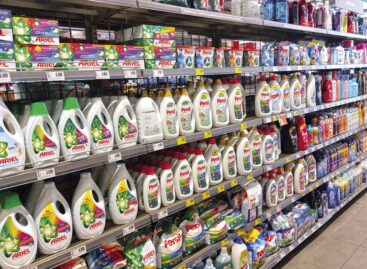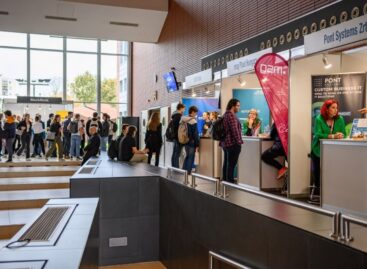Magazine: Change is inevitable and urgent
According to data from the United Nations, from the food that is wasted globally 3 billon people could be fed. What makes the problem even worse is that 10% of the gases causing the climate change come from food that is produced, but left uneaten.

András Nagygyörgy
director of external relations
Hungarian Food Bank Association
András Nagygyörgy, director of external relations at the Hungarian Food Bank Association: “These days everyone needs to pay attention to what and how much they put in their shopping baskets. Grocery shopping is now more planned and there are fewer impulse decisions. Food Bank reaches about 250,000 poor people with the food – products that are about to expire or have some kind of packaging problem – donated by manufacturers and retailers. ” A survey by the Hungarian Food Chain Safety Office (Nébih) has revealed that every year Hungarian households generate 65kg of food waste per person.
Sustainable operations raise the prestige of a brand

Dr. Ágnes Fábián
president
Branded Goods Association Hungary
Leading FMCG brands have great responsibility in working for sustainability and the circular economy. Dr Ágnes Fábián, president of Branded Goods Association Hungary and managing director of Henkel Magyarország: “It isn’t always the big brands that pave the way for the smaller ones, it can also be the other way round. Sometimes start-ups come up with revolutionary solutions, which are adopted by major companies – this is a very important trend, because the capital and production efficiency of these large firms make it possible to set product prices that are affordable for consumers.” In the past manufacturing healthier and more sustainable products was the privilege of few companies, which also created a competitive advantage for them. Today almost every brand owner focuses on this.
Progress is made, but there is still a lot to do

Attila Vörös
managing director
FÉSZ
Attila Vörös, managing director of the Federation of Responsible Food Manufacturers (FÉSZ): “From the three directions of sustainability – environmental, social and economic – manufacturers are focusing on the last one in the difficult economic climate of today. Our experience is that FÉSZ members would like to operate more sustainably. Perhaps the best example of this is transforming the legal background of packaging waste management, which is required by a European Union directive. FÉSZ members are dedicated to meet the target values defined by the EU. There are two things FÉSZ can do in this domain: monitor global trends and regulation changes, and report these to members in an easily understandable fashion; the other thing we can do is communicate the resulting imminent changes in the food industry to decision-makers.”
Packaging isn’t our enemy!

Miklós Nagy
secretary general
CSAOSZ
Miklós Nagy, secretary general of the Hungarian Association of Packaging and Materials Handling (CSAOSZ): “Today not only multinational companies have sustainability programmes, but Hungarian ones as well. For the packaging industry sustainability requirements mean the beginning of a new era. Packaging designers have to utilise a new, more complex approach, in order to be able to minimise material use in a way that the maximum product protection function is preserved.” Mr Nagy thinks it is a mistake to hate plastic and to try to replace it with something else at all costs, because no other material can be used as effectively in food packaging. Packaging isn’t our enemy, as without packaging food perishes, which results in much bigger waste than the actual packaging material that could protect it.

Sustainability marks the start of a new era for the packaging industry
Companies should be the leaders of the change

Irén Márta
managing director
BCSDH
Irén Márta, managing director of the Business Council for Sustainable Development in Hungary (BCSDH): “My view is that the big question isn’t why things need to change, but how we can change them. It is very important to work out practical solutions, tools and scenarios for both climate protection and adapting to the new conditions.” Ms Márta believes that companies should be the leaders of transforming the current system. This transformation can’t happen without an attitude change from executives. If this happens, these managers will change the short- and long-term strategies of their companies, championing issues such as cutting greenhouse gas emission, preserving and restoring biodiversity, and doing away with social injustices. This is also what BCSDH’s Time to Transform 2030 programme is about. //

The rates of responsible managers, conscious employees and consumers have significantly grown lately
Green Pledge project: Advertising industry commits to sustainable operation
Three advertising federations – the Self-regulatory Advertising Board (ÖRT), the Hungarian Marketing Association (MMSZ) and the Association of Hungarian Communication Agencies (MAKSZ) – have made a pledge to make advertisements in a sustainable fashion from now on. Companies, advertisers, agencies and media enterprises are invited to take part in the Green Pledge initiative, which will pay special attention to protecting the environment, avoiding greenwashing and promoting sustainability in general.
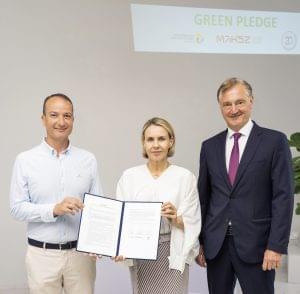
//
MMSZ’s Green Chapter pays visit to Coca-Cola factory
In June more than 40 members of the Hungarian Marketing Association’s (MMSZ) Green Chapter met in the Dunaharaszti factory of Coca-Cola Magyarország. Sonia Dimogli, country manager of Coca-Cola Szolgáltató Kft. spoke to the visitors about the company’s sustainability results and plans.
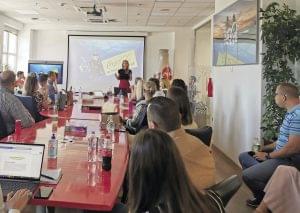
At the meeting with attendance that reached a record high of 40 participants this year…

…everyone’s committed to green issues
Judit Szalóky Tóth, public affairs manager and vice president of MMSZ’s Green Chapter told: in Hungary their bottles and cans are already 100% recyclable, and by 2030 minimum 50% of their packaging will be made of recycled raw material. Ádám Mérő, The Coca-Cola Company’s European consumer and shopper connection director and MMSZ presidency member spoke about the environmental protection and sustainability attitudes of consumers. Velux will host the next MMSZ Green Chapter meeting on 15 November. //
K&H sustainability index: Carbon neutrality is important, but a delay is likely

Levente Suba
head of K&H’s
sustainability programme
At the end of June the findings of K&H’s first sustainability index survey were published. It turned out that only 40% of companies feel they are affected by carbon neutrality efforts. There are hardly any companies that believe they emit more greenhouse gas than their competitors, so they haven’t specified a date by which they want to be carbon neutral.
However, the bigger a company’s sales revenue is, the likelier it keeps track of its greenhouse gas emissions. Only 2% of companies are buying green energy at the moment; currently less than 1% of their total energy consumption is covered by green energy. Levente Suba, the head of K&H’s sustainability programme: “It makes one think that one fifth executives participating in the survey reckon climate change isn’t the result of human activity, so they have nothing to do about it…” //
Services for a sustainable future

Nóra Grőger
business manager
SGS Hungária
SGS Hungária Kft. has been offering sustainability supporting solutions and services for decades. Business manager Nóra Grőger: “We want to assist partners in becoming more responsible from an environmental perspective. Our dedication is indicated by the fact that SGS Hungária Kft. has acquired the FSC® forest management certificate for paper use, the RSPO certification for palm oil utilisation, and it complies with the ISCC Plus standards, which ensures sustainable supply chain management.” //
Circular recycling
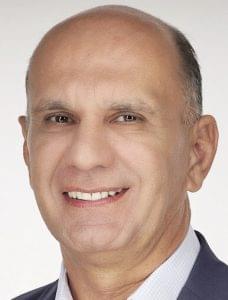
Zsolt Miklós
managing director
Rondo
Corrugated board maker Rondo Hullámkartongyártó Kft. uses eco-friendly raw material, e.g. FSC-certified base papers, wheat starch based adhesive, etc. The company’s climate protection plan includes using less energy, replacing diesel fuel with renewable energy, and installing solar panels. The circular economy is working with 100% of the designs the company makes, throughout the full life cycle of the products – informed Zsolt Miklós, managing director of Rondo Hullámkartongyártó Kft. //
This article can be read on pp 42-49 of Trade magazin 2022.08-09.
Related news
Focusing on fair competition and ethical advertising
🎧 Hallgasd a cikket: Lejátszás Szünet Folytatás Leállítás Nyelv: Auto…
Read more >Fashion, drones and sustainability – the new face of agriculture at the AgriTech InnoExpo event
🎧 Hallgasd a cikket: Lejátszás Szünet Folytatás Leállítás Nyelv: Auto…
Read more >Short wash cycle, long-lasting effect
🎧 Hallgasd a cikket: Lejátszás Szünet Folytatás Leállítás Nyelv: Auto…
Read more >Related news
The Year of the Horse – Culinary trends in 2026
🎧 Hallgasd a cikket: Lejátszás Szünet Folytatás Leállítás Nyelv: Auto…
Read more >




